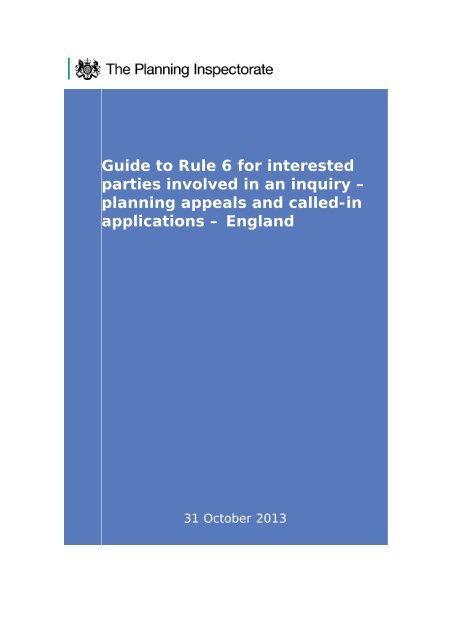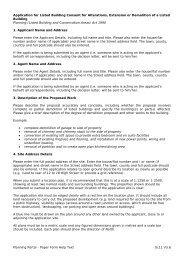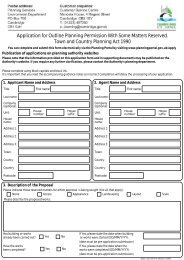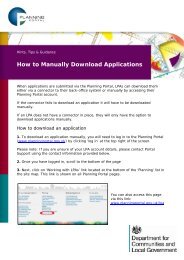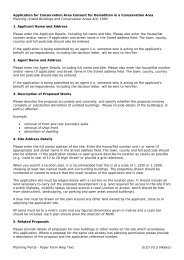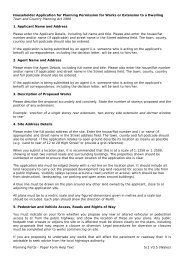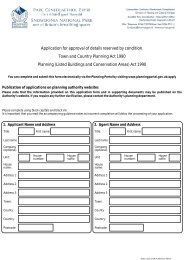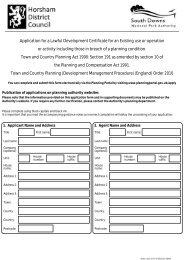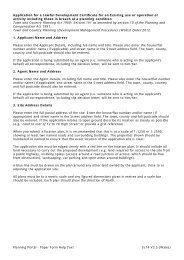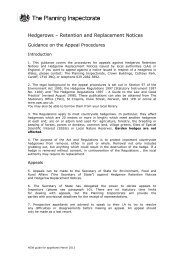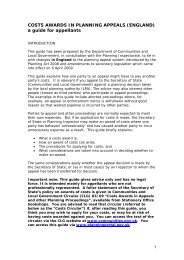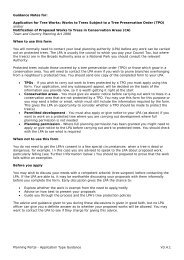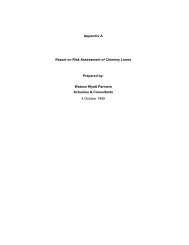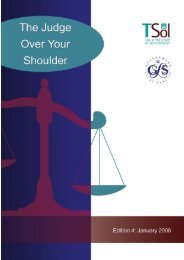Guide to Rule 6 for interested parties involved in ... - Planning Portal
Guide to Rule 6 for interested parties involved in ... - Planning Portal
Guide to Rule 6 for interested parties involved in ... - Planning Portal
Create successful ePaper yourself
Turn your PDF publications into a flip-book with our unique Google optimized e-Paper software.
<strong>Guide</strong> <strong>to</strong> <strong>Rule</strong> 6 <strong>for</strong> <strong><strong>in</strong>terested</strong><strong>parties</strong> <strong><strong>in</strong>volved</strong> <strong>in</strong> an <strong>in</strong>quiry –plann<strong>in</strong>g appeals and called-<strong>in</strong>applications – England31 Oc<strong>to</strong>ber 2013
5.4 If there is more than one <strong>Rule</strong> 6 party it can also be helpful ifthey can jo<strong>in</strong>tly produce a statement of common ground.5.5 For further <strong>in</strong><strong>for</strong>mation please see Annexe J of our “Procedural<strong>Guide</strong>: Plann<strong>in</strong>g appeals – England – 3 Oc<strong>to</strong>ber 2013”:http://www.plann<strong>in</strong>gportal.gov.uk/uploads/p<strong>in</strong>s/procedural_guide_plann<strong>in</strong>g_appeals.pdf6 Proofs of evidence6.1 If you propose <strong>to</strong> give, or <strong>to</strong> call another person <strong>to</strong> give,evidence at the <strong>in</strong>quiry by read<strong>in</strong>g a proof of evidence you must send: 3 copies of it and any written summary <strong>to</strong> us; and one copy of it and any written summary <strong>to</strong> any statu<strong>to</strong>ryparty;no later than 4 weeks be<strong>for</strong>e the date fixed <strong>for</strong> the hold<strong>in</strong>g of the <strong>in</strong>quiry.However if the appeal is follow<strong>in</strong>g a bespoke timetable or the Inspec<strong>to</strong>rhas specified a different timetable <strong>for</strong> the receipt of the proofs of evidenceyou must meet that timetable.6.2 A ‘proof of evidence’ is the document conta<strong>in</strong><strong>in</strong>g the writtenevidence about which a person appear<strong>in</strong>g at a public <strong>in</strong>quiry will speak.Proofs of evidence should be concise and ideally conta<strong>in</strong> facts and exper<strong>to</strong>p<strong>in</strong>ion deriv<strong>in</strong>g from witnesses’ own professional or local knowledge asapplied <strong>to</strong> <strong>in</strong>dividual cases.6.3 Accord<strong>in</strong>gly, the ma<strong>in</strong> role of a ‘proof of evidence’ is <strong>to</strong> allowwitnesses <strong>to</strong>: marshal previously provided evidence <strong>in</strong> a way which isconvenient <strong>to</strong> the presentation of their case at the <strong>in</strong>quiry; give their professional op<strong>in</strong>ion or op<strong>in</strong>ion based on localknowledge on evidence provided by other <strong>parties</strong> <strong>in</strong> theirstatements of case.6.4 Your proof of evidence should: refer <strong>to</strong> the <strong>in</strong><strong>for</strong>mation that your witnesses wish theInspec<strong>to</strong>r <strong>to</strong> take <strong>in</strong><strong>to</strong> account; cover only areas where you disagree with another party; conta<strong>in</strong> the witness’s concisely expressed op<strong>in</strong>ion andargument; conta<strong>in</strong> a clear cross reference <strong>to</strong> any support<strong>in</strong>g documents,<strong>for</strong> example conta<strong>in</strong><strong>in</strong>g data, analysis or copies of legal caseswhich should have been be provided with your statement ofcase; not <strong>in</strong>clude new areas of evidence unless, exceptionally,there is good reason why new factual evidence has <strong>to</strong> awaitthe exchange of written proof(s); not repeat or quote national or local policy, but shouldprovide policy name and paragraph numbers; not omit necessary detail; not <strong>in</strong>clude long irrelevant biographical detail of the witness.6.5 The evidence of each of your witness(es) should address dist<strong>in</strong>ct<strong>to</strong>pics and not overlap another’s.
6.6 Witnesses and their advocates should limit the length of proofs.If the proof exceeds 1,500 words it should be accompanied by asummary. It is normally only the summaries that will be read out at the<strong>in</strong>quiry.6.7 Summaries should concentrate on the ma<strong>in</strong> po<strong>in</strong>ts at issue.They must not <strong>in</strong>troduce new or different evidence nor go beyond thescope of the text they summarise. It may sometimes be difficult <strong>to</strong>summarise complex technical evidence effectively, and the above advice isnot <strong>in</strong>tended <strong>to</strong> prevent witnesses properly expla<strong>in</strong><strong>in</strong>g their evidence.Successful summaries of complex evidence will help make the salientpo<strong>in</strong>ts clearer <strong>to</strong> the <strong><strong>in</strong>terested</strong> <strong>parties</strong>, as well as sav<strong>in</strong>g time.6.8 If the proof of evidence <strong>in</strong>cludes evidence given by an expertwitness please see Annexe O of our “Procedural <strong>Guide</strong>: Plann<strong>in</strong>g appeals –England – 3 Oc<strong>to</strong>ber 2013”:http://www.plann<strong>in</strong>gportal.gov.uk/uploads/p<strong>in</strong>s/procedural_guide_plann<strong>in</strong>g_appeals.pdf7 Core documents7.1 These are documents that are of general/background relevance<strong>to</strong> the <strong>in</strong>quiry. With the agreement of the other <strong>parties</strong>, a document thatwill be referred <strong>to</strong> by more than one party can be added <strong>to</strong> the coredocuments list. Either the local plann<strong>in</strong>g authority or appellant/applicantmay coord<strong>in</strong>ate the core documents list. If you wish <strong>to</strong> suggest <strong>in</strong>clusionof a core document you should provide copies of that document <strong>to</strong> theappellant/applicant, the local plann<strong>in</strong>g authority and <strong>to</strong> any otherstatu<strong>to</strong>ry party.8 Send<strong>in</strong>g documents <strong>to</strong> us electronically8.1 Whilst we encourage electronic work<strong>in</strong>g, we strongly encourage<strong>parties</strong> additionally <strong>to</strong> provide hard copies of certa<strong>in</strong> documents such asstatements of case, proofs of evidence and appendices <strong>to</strong> ensure thesmooth runn<strong>in</strong>g of the <strong>in</strong>quiry. If any document is sent electronically wemay ask you <strong>to</strong> provide hard copies if the document is particularlylengthy. Any pr<strong>in</strong>ted copies must be of the f<strong>in</strong>al versions provided <strong>to</strong> us.Do not use hypel<strong>in</strong>ks with<strong>in</strong> documents you send. If you wish <strong>to</strong> refer <strong>to</strong> adocument then, if it is not a core document, it needs <strong>to</strong> be provided withyour statement of case.8.2 Please see Annexe I “Communicat<strong>in</strong>g electronically with us” ofour “Procedural <strong>Guide</strong>: Plann<strong>in</strong>g appeals – England – 3 Oc<strong>to</strong>ber 2013”http://www.plann<strong>in</strong>gportal.gov.uk/uploads/p<strong>in</strong>s/procedural_guide_plann<strong>in</strong>g_appeals.pdf<strong>for</strong> additional guidance about send<strong>in</strong>g us documents through the Plann<strong>in</strong>g<strong>Portal</strong> or by email.9 Pre-<strong>in</strong>quiry meet<strong>in</strong>gs9.1 When a plann<strong>in</strong>g <strong>in</strong>quiry is likely <strong>to</strong> last 8 or more days a pre<strong>in</strong>quirymeet<strong>in</strong>g is usually held, although one may be held be<strong>for</strong>e a shorter<strong>in</strong>quiry. A pre-<strong>in</strong>quiry meet<strong>in</strong>g is a public meet<strong>in</strong>g but it is pr<strong>in</strong>cipally <strong>for</strong>
the benefit of the Inspec<strong>to</strong>r and ma<strong>in</strong> <strong>parties</strong>. We will <strong>in</strong>vite <strong>Rule</strong> 6 <strong>parties</strong><strong>to</strong> attend the meet<strong>in</strong>g.9.2 The purpose of the meet<strong>in</strong>g is <strong>to</strong> prepare <strong>for</strong> the actual <strong>in</strong>quiryby discuss<strong>in</strong>g procedural and other arrangements. No evidence about thecase will be heard at the meet<strong>in</strong>g. The meet<strong>in</strong>g should help <strong>to</strong> ensure thatthe <strong>in</strong>quiry runs efficiently and will help everyone <strong>to</strong> concentrate on thema<strong>in</strong> issues <strong>in</strong> dispute, sav<strong>in</strong>g time and expense <strong>for</strong> all.10 Openness and transparency10.1 Inquiries are open <strong>to</strong> journalists and the wider public, as well as<strong><strong>in</strong>terested</strong> people. Provided that it does not disrupt proceed<strong>in</strong>gs, anyonewill be allowed <strong>to</strong> report, record and film proceed<strong>in</strong>gs <strong>in</strong>clud<strong>in</strong>g the use ofdigital and social media. Inspec<strong>to</strong>rs will advise people present at the star<strong>to</strong>f the event that the proceed<strong>in</strong>gs may be recorded and/or filmed, andthat anyone us<strong>in</strong>g social media dur<strong>in</strong>g or after the end of the proceed<strong>in</strong>gsshould do so responsibly.10.2 If you want <strong>to</strong> record or film the event on equipment larger thana smart phone, tablet, compact camera, or similar, especially if that islikely <strong>to</strong> <strong>in</strong>volve mov<strong>in</strong>g around the venue <strong>to</strong> record or film from differentangles, you should contact us and the local plann<strong>in</strong>g authority <strong>in</strong> advance<strong>to</strong> discuss arrangements.11 Inquiry arrangements11.1 We ask the local plann<strong>in</strong>g authority <strong>to</strong> arrange the <strong>in</strong>quiryvenue. Inquiries are usually held <strong>in</strong> local plann<strong>in</strong>g authority offices,village halls or community centres. For further <strong>in</strong><strong>for</strong>mation please see thePlann<strong>in</strong>g Inspec<strong>to</strong>rate: “The venue and facilities <strong>for</strong> public <strong>in</strong>quiries andhear<strong>in</strong>gs”:http://www.plann<strong>in</strong>gportal.gov.uk/uploads/p<strong>in</strong>s/venue_and_facilities_<strong>for</strong>_public_<strong>in</strong>quiries_and_hear<strong>in</strong>gs.pdf11.2 We will notify the appellant/applicant, the local plann<strong>in</strong>gauthority and every person entitled <strong>to</strong> appear at the <strong>in</strong>quiry of the date,time, place and expected length of the <strong>in</strong>quiry and the name of theInspec<strong>to</strong>r.11.3 We want <strong>to</strong> hold all <strong>in</strong>quiries <strong>in</strong> build<strong>in</strong>gs with proper facilities <strong>for</strong>people with disabilities. If you, or anyone you know, want <strong>to</strong> go <strong>to</strong> the<strong>in</strong>quiry and you have particular needs, please contact the local plann<strong>in</strong>gauthority <strong>to</strong> confirm that they can make proper arrangements.11.4 Inquiries usually open on a Tuesday at 10:00. Unless there hasbeen a pre-<strong>in</strong>quiry meet<strong>in</strong>g (see section 9 above) the Inspec<strong>to</strong>r will agreethe sitt<strong>in</strong>g times with the ma<strong>in</strong> <strong>parties</strong> at the start of the <strong>in</strong>quiry. It isoften agreed that the <strong>in</strong>quiry will start at 9:30 on subsequent days.Inquiries usually sit until about 17:00 or 17.30 each day but may f<strong>in</strong>ishearlier on a Friday. There will usually be a mid-morn<strong>in</strong>g and midafternoonbreak and a 1 hour break <strong>for</strong> lunch. The Inspec<strong>to</strong>r should notbe approached dur<strong>in</strong>g breaks as other participants <strong>in</strong> the <strong>in</strong>quiry would notknow what was be<strong>in</strong>g said. Inquiries do not usually sit on a Monday.
11.5 At the discretion of the Inspec<strong>to</strong>r, and dependant on a suitable<strong>in</strong>quiry venue be<strong>in</strong>g available, an even<strong>in</strong>g <strong>in</strong>quiry session is occasionallyheld if there are a significant number of <strong><strong>in</strong>terested</strong> <strong>parties</strong> who cannotattend dur<strong>in</strong>g the daytime <strong>in</strong>quiry sessions.12 Advocates12.1 There is no requirement <strong>for</strong> anyone <strong>to</strong> be legally represented bya solici<strong>to</strong>r or barrister. However it is cus<strong>to</strong>mary <strong>for</strong> each of the ma<strong>in</strong><strong>parties</strong> at an <strong>in</strong>quiry <strong>to</strong> have an advocate represent<strong>in</strong>g them. Advocatesdo not need <strong>to</strong> have legal qualifications. Their role is <strong>to</strong> present theirparty’s open<strong>in</strong>g statement, go through each of their witness’s evidence <strong>in</strong>chief, cross-exam<strong>in</strong>e the oppos<strong>in</strong>g <strong>parties</strong>’ witnesses, and present theirparty’s clos<strong>in</strong>g statement. When advocates are <strong>in</strong>experienced theInspec<strong>to</strong>r will assist and advise, where necessary, of the procedures <strong>to</strong> befollowed.12.2 If a <strong>Rule</strong> 6 party does not have an advocate then one of theirwitnesses can act as advocate. This is especially important if you wish <strong>to</strong>cross-exam<strong>in</strong>e any of the other ma<strong>in</strong> <strong>parties</strong>. If you do not nom<strong>in</strong>atesomebody <strong>to</strong> be your advocate then you will need <strong>to</strong> <strong>in</strong>troduce yourself <strong>to</strong>the <strong>in</strong>quiry and present your proof of evidence without anyone tak<strong>in</strong>g youthrough it.13 What happens at the <strong>in</strong>quiry?13.1 An <strong>in</strong>quiry is the most <strong>for</strong>mal of the appeal procedures, and itusually <strong>in</strong>volves larger or more complicated appeals. An <strong>in</strong>quiry may last<strong>for</strong> several days, or even weeks. It is not a court of law, but theproceed<strong>in</strong>gs will often seem <strong>to</strong> be quite similar. Often expert evidence ispresented and witnesses are cross-exam<strong>in</strong>ed (questioned).13.2 The Inspec<strong>to</strong>r will normally have seen the site location and thesurround<strong>in</strong>g area be<strong>for</strong>e the <strong>in</strong>quiry event but will normally make a furtheraccompanied visit dur<strong>in</strong>g or after the <strong>in</strong>quiry.13.3 When the Inspec<strong>to</strong>r opens the <strong>in</strong>quiry on the first day he/shewill firstly deal with any ‘housekeep<strong>in</strong>g’ matters (such as what the <strong>in</strong>quiryis about, where the fire exits are etc). The Inspec<strong>to</strong>r will then usually givean outl<strong>in</strong>e of what will happen at the <strong>in</strong>quiry. The Inspec<strong>to</strong>r will askwhether there are any <strong><strong>in</strong>terested</strong> <strong>parties</strong> who wish <strong>to</strong> speak at the <strong>in</strong>quiry,this is often called “tak<strong>in</strong>g the appearances”.13.4 The order of appearances is at the discretion of the Inspec<strong>to</strong>rwho will usually take <strong>in</strong><strong>to</strong> account the views of the <strong>parties</strong> and theparticular circumstances of the case. The Inspec<strong>to</strong>r will make it clear atthe start of the <strong>in</strong>quiry what the order of appearances will be.13.5 Each of the ma<strong>in</strong> <strong>parties</strong> will make their open<strong>in</strong>g statements,which set out what their case will be. For a plann<strong>in</strong>g <strong>in</strong>quiry the order ofthese is usually the appellant/applicant, the local plann<strong>in</strong>g authority andthen any <strong>Rule</strong> 6 <strong>parties</strong>. When the witnesses give their evidence it isusual <strong>for</strong> the local plann<strong>in</strong>g authority <strong>to</strong> go first, followed by any <strong>Rule</strong> 6<strong>parties</strong> that oppose the appeal/application, then any <strong>Rule</strong> 6 <strong>parties</strong> that
support the appeal/application and f<strong>in</strong>ally the appellant/applicant. Theorder may be different <strong>for</strong> call-<strong>in</strong> <strong>in</strong>quiries.13.6 The Inspec<strong>to</strong>r will usually ask if you are will<strong>in</strong>g <strong>to</strong> answerquestions about your evidence. You do not have <strong>to</strong> do this, though it isoften helpful <strong>to</strong> do so and it may add weight <strong>to</strong> your evidence. Do not feel<strong>in</strong>timidated. The Inspec<strong>to</strong>r will not let anyone ask you hostile or unfairquestions.13.7 Each witness will be taken through their evidence by read<strong>in</strong>gtheir summary proof of evidence and/or parts of their ma<strong>in</strong> proof.Lead<strong>in</strong>g questions, ie. a question <strong>in</strong> which the answer is suggested by thequestion, are not allowed (<strong>for</strong> example “Would you agree that…”). Thewitness then may be subject <strong>to</strong> cross-exam<strong>in</strong>ation by oppos<strong>in</strong>g <strong>parties</strong>.13.8 If you object <strong>to</strong> the proposal, the appellant’s representative mayask you questions. If you support it, the local plann<strong>in</strong>g authority’srepresentative may ask you questions. In turn, <strong>Rule</strong> 6 <strong>parties</strong> shouldensure that their cross-exam<strong>in</strong>ation of other <strong>parties</strong> is succ<strong>in</strong>ct, fair andrelevant <strong>to</strong> the plann<strong>in</strong>g matters at issue.13.9 After cross-exam<strong>in</strong>ation, <strong>parties</strong> can do what is called “reexam<strong>in</strong>ation”.If a witness has made a mistake or got <strong>in</strong> a muddle dur<strong>in</strong>gtheir cross-exam<strong>in</strong>ation, their advocate can try <strong>to</strong> correct th<strong>in</strong>gs bydiscuss<strong>in</strong>g the subject aga<strong>in</strong> and ask<strong>in</strong>g further questions of their witness<strong>to</strong> ensure that their case is clarified. It is not the function of reexam<strong>in</strong>ation<strong>to</strong> <strong>in</strong>vite the witness <strong>to</strong> revisit clear answers given <strong>in</strong> crossexam<strong>in</strong>ation.14 At the end of the <strong>in</strong>quiry14.1 After the evidence has been heard the <strong>parties</strong> may make clos<strong>in</strong>gstatements which are an opportunity <strong>to</strong> sum up their case. They areusually read out loud from a pre-prepared written version and this can beadded <strong>to</strong>, by hand if necessary, be<strong>for</strong>e be<strong>in</strong>g given <strong>to</strong> the Inspec<strong>to</strong>r andother ma<strong>in</strong> <strong>parties</strong>.14.2 After the clos<strong>in</strong>g statements the Inspec<strong>to</strong>r will normally close the<strong>in</strong>quiry. This is followed by the Inspec<strong>to</strong>r mak<strong>in</strong>g arrangements <strong>to</strong> visitthe appeal site.14.3 If the <strong>in</strong>quiry was closed be<strong>for</strong>e the site visit no further detaileddiscussion on the merits of the case will be permitted dur<strong>in</strong>g the <strong>for</strong>malsite visit. This is because it could lead <strong>to</strong> further oral evidence be<strong>in</strong>g givenby one party or <strong><strong>in</strong>terested</strong> person and could compromise the fairness,openness and impartiality of the process. The Inspec<strong>to</strong>r will necessarilybe courteous but firm about not allow<strong>in</strong>g any <strong>in</strong>appropriate discussions orcomments <strong>to</strong> be made at the site visit.14.4 However, where the <strong>parties</strong> have referred <strong>in</strong> their evidence <strong>to</strong>certa<strong>in</strong> physical characteristics of a site, build<strong>in</strong>g or area, the Inspec<strong>to</strong>rwill allow those <strong>to</strong> be po<strong>in</strong>ted out.
15 Costs15.1 There is no cost <strong>to</strong> be<strong>in</strong>g a <strong>Rule</strong> 6 party other than what youmay <strong>in</strong>cur <strong>in</strong> prepar<strong>in</strong>g your evidence (eg pho<strong>to</strong>copy<strong>in</strong>g, b<strong>in</strong>d<strong>in</strong>g andpost<strong>in</strong>g) and attend<strong>in</strong>g the <strong>in</strong>quiry.15.2 There is a Department <strong>for</strong> Communities and Local GovernmentCircular 03/09 “Costs award <strong>in</strong> appeals and other plann<strong>in</strong>g proceed<strong>in</strong>gs”and a booklet, “Costs awards <strong>in</strong> plann<strong>in</strong>g appeals (England) – a guide <strong>for</strong>appellants. You can access these at:http://www.plann<strong>in</strong>gportal.gov.uk/plann<strong>in</strong>g/appeals/guidance/costs15.3 It is important that you read these because they expla<strong>in</strong> how,when and on what basis you can make an application or have anapplication made aga<strong>in</strong>st you.15.4 Costs may be awarded <strong>in</strong> response <strong>to</strong> an application <strong>for</strong> costs byone of the <strong>parties</strong>. In addition, <strong>in</strong> relation <strong>to</strong>: appeals received on or after 1 Oc<strong>to</strong>ber 2013; and called-<strong>in</strong> plann<strong>in</strong>g applications where the date of the call-<strong>in</strong>letter is 1 Oc<strong>to</strong>ber 2013 or later;costs may be awarded at the <strong>in</strong>itiative of the Inspec<strong>to</strong>r.15.5 The Inspec<strong>to</strong>r will rem<strong>in</strong>d <strong>parties</strong> that any application <strong>for</strong> costsshould be made be<strong>for</strong>e the end of the <strong>in</strong>quiry.16 The decision16.1 If it is an <strong>in</strong>quiry <strong>in</strong><strong>to</strong> a called-<strong>in</strong> application or a “recovered”appeal <strong>to</strong> be decided by the Secretary of State, the Inspec<strong>to</strong>r will write areport with recommendations <strong>to</strong> the Secretary of State. Our Case Officerwill normally write <strong>to</strong> the <strong>parties</strong>, with<strong>in</strong> 10 work<strong>in</strong>g days of the close ofthe <strong>in</strong>quiry, <strong>to</strong> let them know the date by which the Secretary of State'sdecision will be issued.16.2 For other appeals the decision will be made by the Inspec<strong>to</strong>r.16.3 When made, the decision (either by the Inspec<strong>to</strong>r or theSecretary of State) will be published on the Plann<strong>in</strong>g <strong>Portal</strong> and can beviewed us<strong>in</strong>g the search facility:www.plann<strong>in</strong>gportal.gov.uk/plann<strong>in</strong>g/appeals/onl<strong>in</strong>e/search17 Further <strong>in</strong><strong>for</strong>mation17.1 For further <strong>in</strong><strong>for</strong>mation about <strong>in</strong>quiries please see our “<strong>Guide</strong> <strong>to</strong>tak<strong>in</strong>g part <strong>in</strong> plann<strong>in</strong>g appeals proceed<strong>in</strong>g by an <strong>in</strong>quiry – England”:http://www.plann<strong>in</strong>gportal.gov.uk/uploads/p<strong>in</strong>s/tak<strong>in</strong>g-part_plann<strong>in</strong>g<strong>in</strong>quiry.pdf
18 Contact<strong>in</strong>g us18.1 To contact us about a particular appeal you should contact ourCase Officer – the local plann<strong>in</strong>g authority should have given you theirdetails. For general enquiries our contact details are:The Plann<strong>in</strong>g Inspec<strong>to</strong>rateTemple Quay House2 The SquareBris<strong>to</strong>lBS1 6PNHelpl<strong>in</strong>e: 0303 444 5000E-mail: enquiries@plann<strong>in</strong>g-<strong>in</strong>spec<strong>to</strong>rate.gsi.gov.uk19 Plann<strong>in</strong>g Aid19.1 You may also wish <strong>to</strong> contact Plann<strong>in</strong>g Aid, who offer free,<strong>in</strong>dependent and professional plann<strong>in</strong>g advice <strong>to</strong> communities and<strong>in</strong>dividuals who cannot af<strong>for</strong>d <strong>to</strong> pay professional fees.Plann<strong>in</strong>g Aid England41-42 Bo<strong>to</strong>lph LaneLondonEC3R 8DLAdvice L<strong>in</strong>e: 0330 123 9244Switchboard: 020 7929 9494Fax: 020 7929 9490Email: <strong>in</strong>fo@plann<strong>in</strong>gaid.rtpi.org.ukWebsite: www.rtpi.org.uk/plann<strong>in</strong>gaid
Annexe ATimetable <strong>for</strong> the <strong>in</strong>quiry procedure (<strong>for</strong> appeals not follow<strong>in</strong>g abespoke timetable)This applies <strong>to</strong> appeals: where the local plann<strong>in</strong>g authority’s decision notice is dated30 September 2013 or earlier; where the local plann<strong>in</strong>g authority was due <strong>to</strong> make itsdecision on 30 September 2013 or earlier but has failed <strong>to</strong> doso; and which are “recovered” <strong>for</strong> the Secretary of State (rather thanone of our Inspec<strong>to</strong>rs) <strong>to</strong> decide (this does not depend on thedate of the local plann<strong>in</strong>g authority’s decision).TimetableAppeal receivedWe set the start dateand the timetableWith<strong>in</strong> 2 weeksfrom the start dateWith<strong>in</strong> 6 weeksfrom the start<strong>in</strong>gdateOnly exceptionallywill we accept latestatements orrepresentationsInterested people,<strong>in</strong>clud<strong>in</strong>g <strong>Rule</strong> 6<strong>parties</strong>Receive the localplann<strong>in</strong>g authority’sletter about theappeal, tell<strong>in</strong>g themthat they must sendus anyrepresentationswith<strong>in</strong> 6 weeks ofthe start dateSend theirrepresentations <strong>to</strong>usNote – <strong>Rule</strong> 6<strong>parties</strong> send us their<strong>in</strong>quiry statementnormally with<strong>in</strong> 4weeks of our letterwhich grants them“<strong>Rule</strong> 6 status”.AppellantSends the appeal<strong>for</strong>m and allsupport<strong>in</strong>gdocuments <strong>to</strong> usand the localplann<strong>in</strong>g authority.The grounds ofappeal should makeup the full caseNote - <strong>for</strong> an appealwhere the date ofthe local plann<strong>in</strong>gauthority decision is1 Oc<strong>to</strong>ber 2013(which issubsequentlyrecovered) theappellant will sendtheir full statemen<strong>to</strong>f case. and a draftstatement ofcommon ground atthis po<strong>in</strong>tReceives acompletedquestionnaire andany support<strong>in</strong>gdocuments from thelocal plann<strong>in</strong>gauthoritySends us their<strong>in</strong>quiry statementand the statemen<strong>to</strong>f common groundthat they haveagreed with thelocal plann<strong>in</strong>gauthority)Note - <strong>for</strong> an appealwhere the date ofthe local plann<strong>in</strong>gLocal plann<strong>in</strong>gauthorityReceives the appealdocumentsSends the appellantand us a completedquestionnaire andsupport<strong>in</strong>gdocuments. It writes<strong>to</strong> <strong><strong>in</strong>terested</strong> peopleabout the appealSends us its <strong>in</strong>quirystatementNote - <strong>for</strong> an appealwhere the date ofthe local plann<strong>in</strong>gauthority decision is1 Oc<strong>to</strong>ber 2013(which issubsequentlyrecovered) the localplann<strong>in</strong>g authority
We set the <strong>in</strong>quirydate which willnormally be with<strong>in</strong>20 – 22 weeks ofthe start date4 weeks be<strong>for</strong>e the<strong>in</strong>quiryAt least 2 weeksbe<strong>for</strong>e the <strong>in</strong>quiryNo later than 10work<strong>in</strong>g daysbe<strong>for</strong>e the <strong>in</strong>quiry<strong>Rule</strong> 6 <strong>parties</strong> sendus their proof ofevidenceReceive details fromthe local plann<strong>in</strong>gauthority about the<strong>in</strong>quiryarrangementsauthority decision is1 Oc<strong>to</strong>ber 2013(which issubsequentlyrecovered) theappellant wouldhave already senttheir full statemen<strong>to</strong>f case – so they donot have theopportunity <strong>to</strong>provide a statemen<strong>to</strong>f case at the 6week stageSends us their proofof evidence.Displays a notice onsite giv<strong>in</strong>g details ofthe <strong>in</strong>quiryIf there is one,sends us the draftplann<strong>in</strong>g obligationprovides the agreedstatement ofcommon ground atthe 6 weeks stageSends us its proof ofevidence. It mayput a notice <strong>in</strong> alocal paper aboutthe <strong>in</strong>quiryNotifies <strong><strong>in</strong>terested</strong>people about the<strong>in</strong>quiryarrangements
Annexe BTimetable <strong>for</strong> the <strong>in</strong>quiry procedure (<strong>for</strong> appeals not follow<strong>in</strong>g abespoke timetable)This applies <strong>to</strong> appeals: where the local plann<strong>in</strong>g authority’s decision notice is dated1 Oc<strong>to</strong>ber 2013 or later; where the local plann<strong>in</strong>g authority was due <strong>to</strong> make itsdecision on or after 1 Oc<strong>to</strong>ber 2013 but has failed <strong>to</strong> do so.It does not apply <strong>to</strong> appeals which are “recovered” <strong>for</strong> the Secretary of State <strong>to</strong> decide.TimetableAppeal receivedWe set the start dateand the timetableWith<strong>in</strong> 1 weekfrom the start dateWith<strong>in</strong> 5 weeksfrom the start dateOnly exceptionallywill we accept latestatements orrepresentationsWe set the <strong>in</strong>quirydate which willnormally be with<strong>in</strong>16 weeks of thestart date4 weeks be<strong>for</strong>ethe <strong>in</strong>quiryAt least 2 weeksbe<strong>for</strong>e the <strong>in</strong>quiryNo later than 10work<strong>in</strong>g daysbe<strong>for</strong>e the <strong>in</strong>quiryInterested people<strong>in</strong>clud<strong>in</strong>g <strong>Rule</strong> 6<strong>parties</strong>Receive the localplann<strong>in</strong>g authority’sletter about theappeal, tell<strong>in</strong>g themthat they must sendus anyrepresentationswith<strong>in</strong> 5 weeks ofthe start dateSend theirrepresentations <strong>to</strong> usNote – <strong>Rule</strong> 6 <strong>parties</strong>send us their <strong>in</strong>quirystatement normallywith<strong>in</strong> 4 weeks ofour letter whichgrants them “<strong>Rule</strong> 6status”<strong>Rule</strong> 6 <strong>parties</strong> sendus their proof ofevidenceReceive details fromthe local plann<strong>in</strong>gauthority about the<strong>in</strong>quiryarrangementsAppellantSends the appeal <strong>for</strong>mand all support<strong>in</strong>gdocuments <strong>to</strong> us andthe local plann<strong>in</strong>gauthority. The fullstatement of casemust make up the fullcase. Also provides adraft statement ofcommon groundReceives a completedquestionnaire and anysupport<strong>in</strong>g documentsfrom the localplann<strong>in</strong>g authoritySends us their proofof evidence.Displays a notice onsite giv<strong>in</strong>g details ofthe <strong>in</strong>quiryIf there is one, sendsus the draft plann<strong>in</strong>gobligationLocal plann<strong>in</strong>gauthorityReceives theappeal documentsSends theappellant (orapplicant) and usa completedquestionnaire andsupport<strong>in</strong>gdocuments. Itwrites <strong>to</strong><strong><strong>in</strong>terested</strong> peopleabout the appealSends us its fullstatement of caseand the agreedstatement ofcommon groundSend us its proofof evidence. Itmay put a notice<strong>in</strong> a local paperabout the <strong>in</strong>quiryNotifies <strong><strong>in</strong>terested</strong>people about the<strong>in</strong>quiryarrangements


